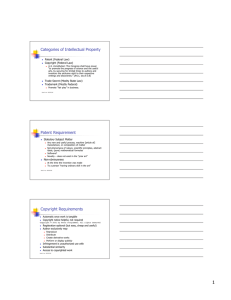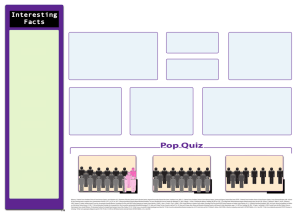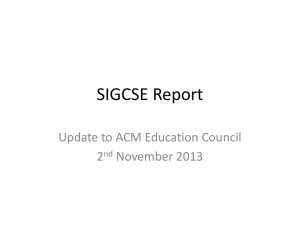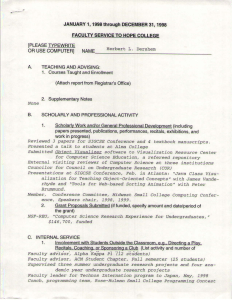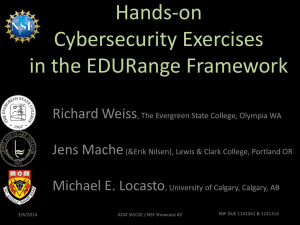How Students “Measure Up”: Creation of an Assessment Tool for CS1
advertisement
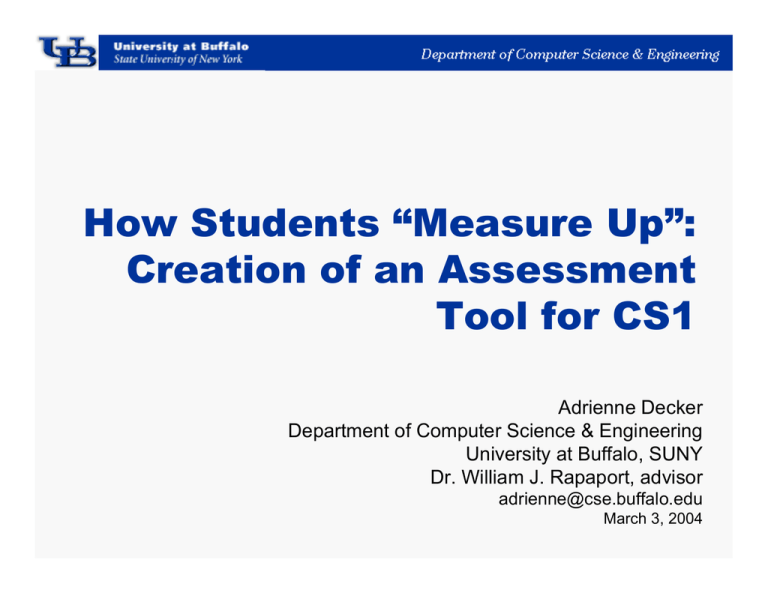
How Students “Measure Up”: Creation of an Assessment Tool for CS1 Adrienne Decker Department of Computer Science & Engineering University at Buffalo, SUNY Dr. William J. Rapaport, advisor adrienne@cse.buffalo.edu March 3, 2004 Introduction CC2001 and previous curricula do not provide implementation instructions. Faculty innovate courses based on suggestions and their own interpretations. Investigations into the usefulness of these innovations most often use lab grade, overall course grade, resignation rate, or exam grades 2 Cooper, Dann, & Pausch, 2003; Decker, 2003; Ventura, 2003 Problem: not proven reliable or valid. SIGCSE DC 2004 Reliability & Validity Reliability “Degree of consistency among test scores” Validity Reliability + Relevance (Marshall & Hales, 1972) 3 SIGCSE DC 2004 Goals of Research Create a reliable and validated assessment tool for CS1 4 Independent of objects-first, imperatives-first, or functional-first approaches. Independent of any particular language. SIGCSE DC 2004 Motivation No such tool exists. Other tools are not validated or created for this purpose. AP Exam GRE Subject Test & ETS Major Field Tests 5 Not CC2001, specific language, prediction not assessment End of 4-year undergraduate curriculum SIGCSE DC 2004 Previous Investigations Predictors Research ITiCSE 2001 Working Group 6 Kurtz, 1980; Mazlack, 1980 Leeper & Silver, 1982; Evans & Simkin, 1989 Hagan & Markham, 2000; Wilson & Shrock, 2001 Ventura, 2003 Tested programming skill Too mathematical? SIGCSE DC 2004 Researcher’s Previous Work Performance of Non-Majors Analysis of AP Exam 7 Used exam grades to assess mastery of material Correlation for AP CS A Exam No correlation for AP CS AB Exam SIGCSE DC 2004 Proposed Work 8 Analysis of CC 2001 Programming-First Approaches Creation of Test Relevance Assessed by Community Field Testing Assessment of Reliability Assessment of Validity SIGCSE DC 2004 Open Issues 9 Is this even possible/feasible/reasonable? Intersection of programming-first approaches too small Should have a language component\ Current status: Final (?) draft of proposal to committee for defense this semester. SIGCSE DC 2004 Bibliographic References 10 Cooper, S., Dann, W., & Pausch, R. (2003). Teaching objects-first in introductory computer science. Paper presented at the 34th SIGCSE technical symposium on Computer Science Education, Reno, Nevada. Decker, A. (2003). A tale of two paradigms. Journal of Computing Sciences in Colleges, 19(2), 238-246. Evans, G. E., & Simkin, M. G. (1989). What best predicts computer proficiency? Communications of the ACM, 32(11), 1322 - 1327. Hagan, D., & Markham, S. (2000). Does it help to have some programming experience before beginning a computing degree program? Paper presented at the 5th annual SIGCSE/SIGCUE conference on Innovation and technology in computer science education. Joint Task Force on Computing Curricula. (2001). Computing curricula 2001 computer science. IEEE Computer Society & Association for Computing Machinery. Retrieved October 30, 2003, from the World Wide Web: http://www.computer.org/education/cc2001/final/index.htm Kurtz, B. L. (1980). Investigating the relationship between the development of abstract reasoning and performance in an introductory programming class. Paper presented at the 11th SIGCSE technical symposium on Computer Science Education, Kansas City, Missouri. SIGCSE DC 2004 References - Continued 11 Leeper, R. R., & Silver, J. L. (1982). Predicting success in a first programming course. Paper presented at the 13th SIGCSE technical symposium on computer science education, Indianapolis, Indiana. Marshall, J. C., & Hales, L. W. (1972). Essentials of Testing. Reading, Massachusetts: Addison-Wesley Publishing Co. Mazlack, L. J. (1980). Identifying potential to acquire programming skill. Communications of the ACM, 23(1), 14 - 17. McCracken, M., Almstrum, V., Diaz, D., Guzdial, M., Hagan, D., Kolikant, Y. B.-D., Laxer, C., Thomas, L., Utting, I., & Wilusz, T. (2001). A multi-national, multi-institutional study of assessment of programming skills of the first-year CS students. SIGCSE Bulletin, 33(4), 1 - 16. Ventura, P. R. (2003). On the origins of programmers: Identifying predictors of success for an objects-first CS1. Unpublished Doctoral, University at Buffalo, SUNY, Buffalo. Wilson, B. C., & Shrock, S. (2001). Contributing to success in an introductory computer science course: A study of twelve factors. Paper presented at the 32nd SIGCSE technical symposium on Computer Science Education, Charlotte, North Carolina SIGCSE DC 2004
